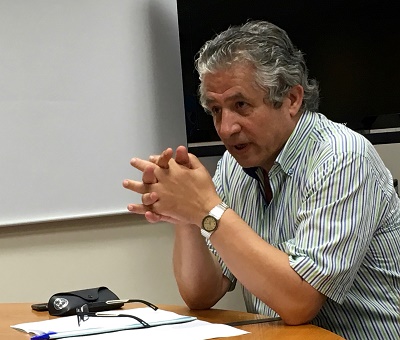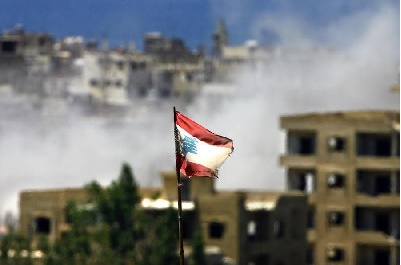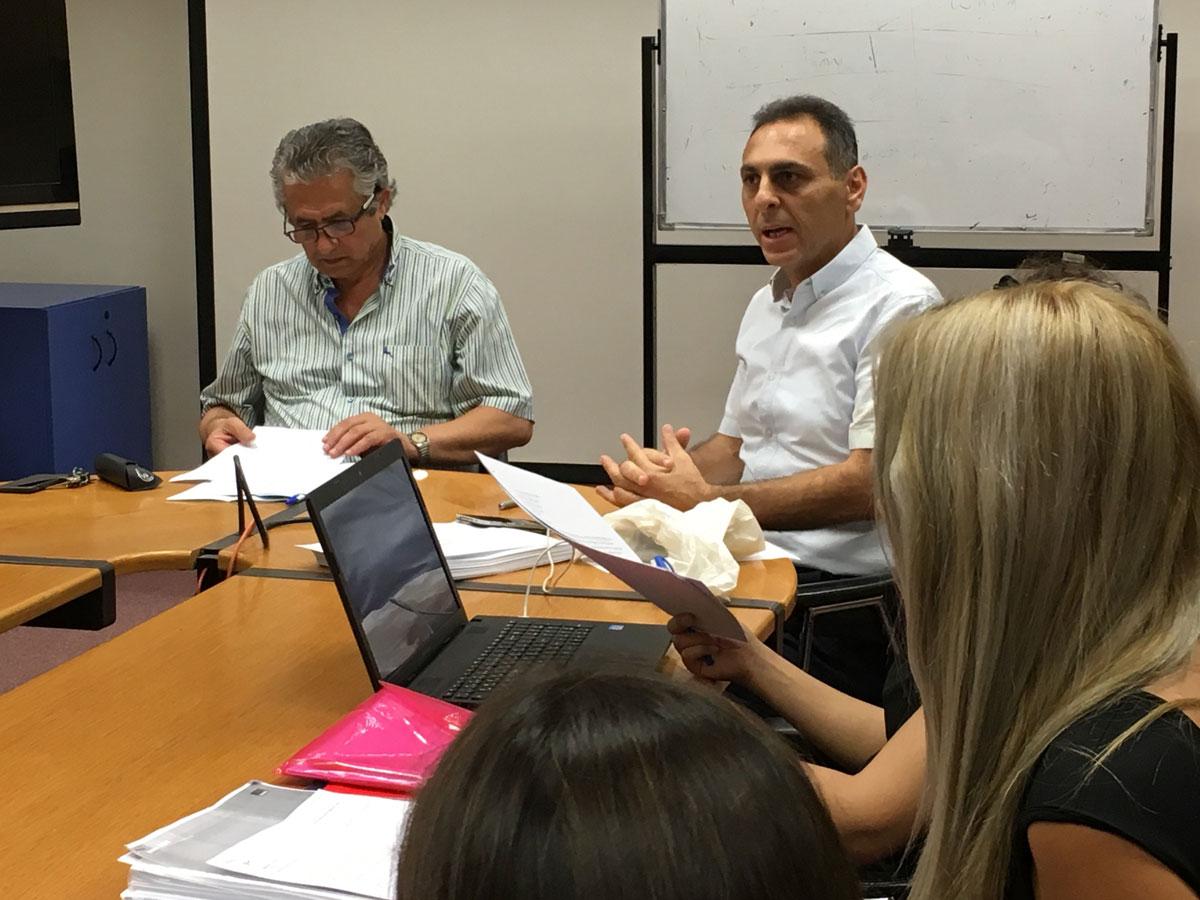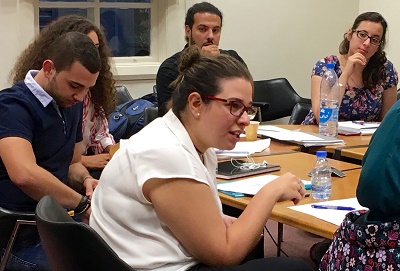Discussion with Dr. Hassan Krayem on the Prospects of Electoral Reform in Lebanon
Lecture: Prospects of Electoral Reform in Lebanon
September 26, 2016 5:00 PM
Nicol 222, Beirut campus
The Institute for Social Justice and Conflict Resolution and the Department of Social Sciences hosted a lecture titled “Prospects of Electoral Reform in Lebanon” by Hassan Krayem.

Krayem holds an M.A. and a Ph.D. in Political Science from University of Southern California in Comparative Politics and Economic Development. He has been working in the field of governance for the past 12 years as a governance policy specialist and governance program manager for UNDP country office in Lebanon. He has managed more than 20 projects in the areas of fiscal and economic governance, elections, administrative reform, justice reform, parliamentary development and human rights. Krayem has been working as a lecturer of political science at the American University of Beirut since 1998. He has written three books and more than 20 articles on Arab politics, democratization, elections and governance.
This event is part of Associate Professor Imad Salamey’s graduate seminar titled “Lebanese Electoral Politics”.
In the Press
Outlook grim for effective electoral reform in Lebanon

A Lebanese flag flies as smoke rises from the Nahr al-Bared refugee camp in northern Lebanon June 3, 2007.
Reuters/Jerry Lampen
27 September 2016
BEIRUT: Opaque, inadequate laws consistently prevent fair and stable elections, Hassan Krayem, a governance program manager for the United Nations Development Program, explained Monday at a talk held at the Lebanese American University. Ahead of planned elections next summer, Krayem discussed historic and current issues preventing effective electoral reform, during a lecture titled “Prospects of Electoral Reform in Lebanon.”
“We have a confessional system, and it is creating this entire problem,” explained the UNDP expert.
Krayem has managed numerous projects on economic and fiscal governance, elections, and parliamentary development at UNDP.
“The No. 1 observation in Lebanon is that there has never been stability in legislation for the electoral law,” Krayem told a room of students. “The only period that witnessed some sort of stability was from 1960-1972.”
Krayem outlined the main causes and impacts of poor electoral legislation, starting with significant issues in advancing a functional government.
However, he highlighted the lack of parity between various confessional groups as an obstacle to a stable electoral law that satisfies all groups and ensures an unbiased outcome.
Lebanon’s push to agree upon a fair, efficient electoral law has ultimately been a failure, he explained.
In the ’40s and ’50s, gerrymandering was a consistent issue, and the reforms in 1960 were considered an indirect cause of Lebanon’s violent Civil War, Krayem said. But these issues also continued after the war.
“Only 30 percent voted in the elections [in 1992] because many Christians and residents of Beirut were boycotting [them],” Krayem added. This can be contrasted with the 2009 general election which saw around 50 percent turnout.
After detailing Lebanon’s failures to produce effective electoral reform, Krayem detailed current issues that could prevent consensus on an effective solution ahead of the potential vote in 2017.
“We have agreed in Lebanon to parity in everything – in representation between Christians and Muslims to respect such diversity within our country,” he began. “However, in real demography we don’t have this … and thus no matter what we do, there will be distortion.”
The sectarian imbalance isn’t the only contemporary issue. The global Lebanese diaspora has been barred voting rights during elections, but could have a massive impact on the outcome if enfranchised.
“Think about how many Lebanese are abroad, and I mean those who were born in Lebanon. Most of them are Christian, and they have no way to vote during the elections.”
While there will likely be challenges if elections go ahead next summer – not least due to the lack of a president – a vote shouldn’t be seen as a fix-all to national problems, Krayem said. “Elections are not an end by itself. They are a means. I don’t want elections because I love them, I want them because they create representation, a stable political system and allow for monitoring and oversight,” he concluded. “Otherwise there is no point in holding them.”
Audience Responses
On Monday, the 26th of September, Dr. Hasan Krayem discussed the dilemma of choosing an electoral system in divided societies. The speaker made us aware about several things; among those were: the fact that the civil war prevented any parliamentary elections thus preserving the same parliament-or what remained of it, according to Krayem, for 20 years; second, the significance of electoral aspects other than the electoral system and the district size, such as unified ballots, out of country voting, supervision and independent commission… I was specifically interested in the historical aspect of the discussion, the 1960s era and Chehabism… and it was important to know that several politicians back then, like Kamal Joumblatt and others were politically aware that this “religious representation” is taking the country to a deadlock, thus requesting a fully proportional and secular state.
Furthermore, it was also interesting to know more about the Boutros draft law, which according to Krayem, is the best law ever drafted in Lebanon because it didn’t only include a mixed system of both majoritarian (77 seats) and proportional (51 seats) representation, but also focused on other very essential aspects of elections. Very significant questions were asked, most importantly about the relation between the political and social contexts and the electoral system. If we had more time, I would have been interested in asking Krayem about his opinion regarding the recent political debate about the proportional law (last June) whereby Hassan Nasrallah supported implementing a fully proportional system, leading the Future Front to reply back that Hezbollah needs to disarm first before asking for a proportional law; and it would have also been interesting to discuss the recent suggestion by Nabih Berry for a proportional law along with dividing the country into 13 electoral districts.

The presentation was interesting and beneficial to the material of the course. It made me aware that in this country instead of establishing a modern electoral system we went back to an old one from 1960 and before every single election we need a new electoral law depending on the political context. The most interesting part was about the history of the electoral laws in Lebanon, from 1958 till 2009, and the Boutros Law. The most interesting questions were the one about Boutros Law because I didn’t know anything about that law before, and also the one about political agreement being more important than establishing an electoral law made sense in the context of the discussion. I wanted to ask another question about the possibility of establishing a senate in Lebanon and if we do, how will it be formed and how the representatives would be elected. We could explore in the future the possibility of establishing a senate as well as how exactly should we integrate women and youth into being representatives.
The presentation was comprehensive in providing a deeper historical background of the current problems of choosing an electoral system in Lebanon. The speaker has raised awareness about how culture and tradition still stand as barriers in changing many essential factors, such as representation of women. He also provided a smooth historical insight and how the Lebanese politics transited from one phase to the other, and how the problems of trust are bolstered between interest groups. It was not clear though, how the civil war phase contributed to the problems (meaning who was with/against whom, how it shifted cooperation between interest groups). The most interesting part is how the speaker is being realistic about the situation, due to many persistent factors that are at least hard to change. It was interesting also to know more about how Syria affected the political transition in Lebanon, and how the complicated situation was exacerbating the problems of Lebanese politics. The first question about the concerns of Muslims and Christians in terms of electoral districts and voting mechanism was intriguing, as it highlighted how different interest groups weigh perspectives versus each other in choosing an electoral system. d. I also wanted to ask about the role of judiciary system and the constitutionality of the laws and the current government, but it was already tackled by a colleague. The answer to it made it clear how complicated the situation is, since the judiciary didn’t sound like an independent body.

I thoroughly enjoyed Dr. Krayem’s presentation. I liked that he has extensive knowledge about the Lebanese system and political history. The most interesting part about the discussion was perhaps the historic perspective with regards to the Lebanese Parliament and its stagnation and failure to adopt a unified electoral system which results in political instability each time election time comes about. I liked Mohamad’s Question regarding the political agreement and lack of achievements during the past years which I think Dr. Krayem did not answer. In all countries around the world governments are held accountable for their agenda setting and how much of that agenda they achieved during their time in power, However the Lebanese Government despite its lingering presence has no goals or objectives that have been met. I would have liked to ask Dr. Krayem to suggest possible electoral systems that might work in the Lebanese context. Given his expertise I would have liked for him to explore more actual details about potential electoral systems that might be useful in coming up with a new draft electoral law besides the Boutros law. It was very frustrating that he exclusively bound the success of an electoral system to the political agreement and that there is nothing else to do but wait for them to reach a compromise.
Over all, I found the presentation to be very insightful and interesting. Dr Krayem really informed me of the problems in Lebanon’s political system; all of which contribute to Lebanon’s current situation. What I found particularly interesting was the discussion of previous elections and how different laws were implemented in each, following the 1960-1972 Fouad Chehab reform. I also enjoyed the discussion of how the death of the president of a neighboring country (Hafez Al Assad in Syria) lead to political struggle in Lebanon amongst the Lebanese & Syrians, and how this struggle was apparent amongst the separation of Lebanese political figures (By Hariri & Jumblatt forming an alliance). I found Hala’s question insightful, in regards to why we aren’t using the Boutros law, though it is a well drafted law. Unfortunately, like many aspects in Lebanon, the law wasn’t taken seriously by the political class. I would have liked to ask Dr. Krayem about his personal opinion on the upcoming law for the 2017(hopefully) elections; is it possible that Lebanon will stick to an election system here on out? All in all, I highly enjoyed the discussion presented by Dr. Krayem, though I think 2 hours is not enough to discuss Lebanon’s political system.
Dr. Krayem is an expert in his domain explaining the root causes of Lebanese fractured and sectarian politics. To understand Lebanese politics today, it is essential to study its history. Indeed, Dr. Krayem went briefly through the Lebanese history explaining who made our Electoral Systems. With the three main Electoral Systems (Majoritarian, PR, Mixed systems), Lebanon chose to have a Majoritarian system (Block Vote) based on a confessional division in the House of Representatives ( ratio 5:5 Christian to Muslim). Lebanon has been witnessing a continuous struggle between different sectarian groups. The only period of stability, as Dr. Krayem notes, was seen during President’s Chehab’s administration (1960-1972). President Chehab, known as a reformist, followed a new electoral system which divided Lebanon into five administrative districts with 26 provinces. The 1960 Electoral Law had been also used during the 2009 elections after the Doha Agreement. There are no enhanced reformed Draft Electoral Laws that are being used despite of new drafted Laws such as Boutros Law which divides Lebanon into 77 administrative districts and 51 provinces. As Dr. Krayem states, “The same MPs are drafting the law, so do you think they would draft a law that would work against them?” he is right, we are asking the same politicians who have been in power for 30+ years to draft an Electoral Law that would be more representative and thus may endanger their existence. Hence, Lebanese politicians depend on old Electoral Laws with minor modifications to ensure their re-election.Political elites divide Lebanon into such districts that would determine the winners and the losers even before the Election Day, what is also known as gerrymandering. Dr. Krayem added that there is a problem within the society itself. The Lebanese demography has shifted and the parity which had been agreed on (5:5) is no longer applicable with the estimated real demography today. However, Dr. Krayem proposes to keep the parity as it is in the constitution and reform anything beyond it. Realpolitik, on the other hand, shows that Lebanese elites would not reform anything that would minimize their existence. What could be done is to focus on less threatening issues for sectarian elites such as introduce a ballot paper, supervise the elections, ensure independency, follow automated out of country voting, control for spending and secure women’s representation. These modifications would enhance and advance the Electoral System. As Krayem notes, “Elections is a means for representation and not an end.” For Lebanese elites it is an end by itself to reproduce the same sectarian system. What would be the solution to end this ever-lasting conflict? “Patience”, said Dr. Krayem. It was a very impressive and informative discussion that examined the reality the Lebanese population is living.